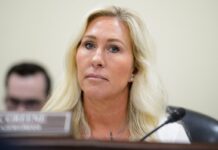
Georgia’s public education leaders heard vastly different approaches to teacher pay and keeping schools safe from the two gubernatorial candidates vying for their votes in November. At the recent Georgia School Boards Association (GSBA) Conference in Savannah, Democrat Stacey Abrams discussed stricter gun safety laws, while Republican Gov. Brian Kemp focused on school security plans and active shooter classes for school resource officers.
“We have to remain vigilant and learn how to best spot the warning signs so that we can intervene before tragedy occurs,” Kemp told hundreds of school board members from districts across the state.
Abrams talked about her opposition to Georgia’s gun laws, including the permitless carry bill passed during the recent legislative session and the so-called “guns everywhere law” enacted in 2014 when she served in the Georgia House of Representatives.
“Georgia has to have gun safety laws that let us protect the Second Amendment and protect second graders at the exact same time,” Abrams said.
When Kemp mentioned the teacher raises totaling $5,000 since he took office, the GSBA audience applauded and cheered.
But Abrams told the group those raises were not enough.
“While yes, we should give credit for raises that have come in, we have to start with our baseline pay,” Abrams told GSBA attendees. “Our baseline pay is woefully low. We’re 21st in teacher pay. We’re the eighth-largest state in the nation.”
Over the weekend, Abrams announced she would push starting teacher pay in Georgia to $50,000, an increase of about $11,000 from the current level. The proposal is an estimated $1.65 billion increase over four years.
Abrams revealed her plan on Sunday during an endorsement announcement from the Georgia Association of Educators (GAE).
At the GSBA conference, both Kemp and Abrams addressed the impact of mental health issues on school security.
“The ratio of mental health support counselors to students is 1-to-452,” Abrams said. “It should be 1-to-250. We are woefully underserving our young people.”
Abrams emphasized the need for access beyond school grounds by expanding Medicaid in Georgia “to draw down billions of dollars, including mental health support.”
Kemp talked about the importance of the $65 million Mental Health Parity Act he recently signed into law which requires public and private health insurance plans to cover behavioral health equitably with physical health.
“This historic bill includes robust reforms and resources to address mental health challenges in our state,” Kemp said in his speech. “We’ve also provided further funding to the APEX program to focus on mental health in our schools.”
Georgia’s fiscal year 2023 budget, which begins on July 1, allocates $5.5 million to APEX in engaging community-based mental health providers to offer school services.
The more than 650 GSBA conference in-person attendees and several hundred school board members who watched via livestream also heard from the candidates for state school superintendent. Republican Richard Woods, the current state school superintendent, and his Democratic challenger, Alisha Thomas, also prioritized school safety issues in their messages.
Conference organizers invited the statewide candidates to address local school board members who set policies for their districts.
“GSBA strives to ensure its membership has access to data and information that supports the decisions they make on behalf of their systems,” said Valarie Wilson, GSBA executive director. “Education is at the forefront in this election. Hearing the thoughts and beliefs of all candidates is more important now than ever before. It was, for this reason, we worked hard to get all nominees to speak to our membership.”
This article appears on Now Habersham in partnership with GPB News






